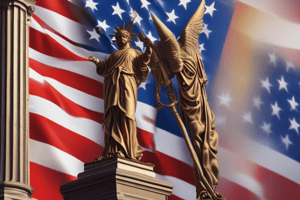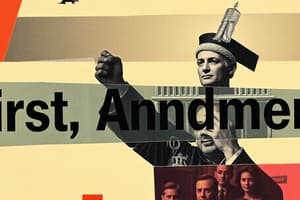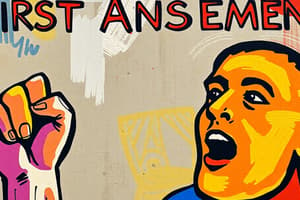Podcast
Questions and Answers
The __ Amendment's protects people's freedom of religion, __, press, assembly, and petition.
The __ Amendment's protects people's freedom of religion, __, press, assembly, and petition.
first, speech
The First Amendment's protection of __ lies at the heart of an open, __ society.
The First Amendment's protection of __ lies at the heart of an open, __ society.
speech, democratic
What are examples of pure speech?
What are examples of pure speech?
Talking with friends or addressing a crowd.
What are examples of symbolic speech?
What are examples of symbolic speech?
In the balancing test, what is weighed against the benefit to an individual?
In the balancing test, what is weighed against the benefit to an individual?
Which categories of speech can be punished on content?
Which categories of speech can be punished on content?
What is spoken defamation called?
What is spoken defamation called?
What is published defamation called?
What is published defamation called?
What type of speech is banned if it is false or misleading?
What type of speech is banned if it is false or misleading?
In 1969, the Supreme Court ruled that only speech directed toward inciting immediate lawlessness could be punished.
In 1969, the Supreme Court ruled that only speech directed toward inciting immediate lawlessness could be punished.
Regulations on expression must be viewpoint neutral.
Regulations on expression must be viewpoint neutral.
Places in which rules about __ __ are different than in the general public include prisons, __, and the military.
Places in which rules about __ __ are different than in the general public include prisons, __, and the military.
Why are restrictions placed on some forms of speech?
Why are restrictions placed on some forms of speech?
What does the First Amendment guarantee freedom of?
What does the First Amendment guarantee freedom of?
Freedom of the press means that government __ is prohibited by the First Amendment.
Freedom of the press means that government __ is prohibited by the First Amendment.
What is a press free of censorship able to do?
What is a press free of censorship able to do?
Prior restraint is generally presumed constitutional by US courts.
Prior restraint is generally presumed constitutional by US courts.
What are the requirements placed on the government regarding religion under the First Amendment?
What are the requirements placed on the government regarding religion under the First Amendment?
What does the Establishment Clause do?
What does the Establishment Clause do?
What aspects of religion are still allowed in public schools?
What aspects of religion are still allowed in public schools?
What does the right to free assembly mean?
What does the right to free assembly mean?
What legislation prohibited discrimination in employment based on race and gender?
What legislation prohibited discrimination in employment based on race and gender?
What does procedural due process mean?
What does procedural due process mean?
What rights are considered fundamental by the Supreme Court?
What rights are considered fundamental by the Supreme Court?
What is the purpose of the 14th Amendment?
What is the purpose of the 14th Amendment?
What was the outcome of Brown v. Board?
What was the outcome of Brown v. Board?
What major impact did Roe v. Wade have?
What major impact did Roe v. Wade have?
What does the government balance when regulating assembly?
What does the government balance when regulating assembly?
Flashcards are hidden until you start studying
Study Notes
First Amendment Rights
- Protects freedom of religion, speech, press, assembly, and petition.
- Speech is central to an open, democratic society.
- Pure speech includes talking with friends or addressing a crowd, while symbolic speech includes actions like flag-waving.
- The balancing test weighs public danger against individual expression rights.
Categories of Punishable Speech
- Obscenity, defamation, and fighting words fall under punishable speech categories.
- Slander refers to spoken defamation, whereas libel applies to published defamation.
- Commercial speech, if false or misleading, is banned to protect consumers.
Supreme Court on Speech
- In 1969, the Supreme Court specified that only speech inciting immediate lawlessness is punishable.
- Regulations on expression must be viewpoint neutral and uniformly enforced across groups.
- Free speech regulations differ in places like schools, prisons, and the military.
Freedom of the Press
- The First Amendment guarantees press freedom, encompassing various media forms.
- Government censorship is forbidden, allowing press scrutiny of political and legal institutions.
- Prior restraint is deemed unconstitutional unless significant harm is provoked.
Rights of Petition and Assembly
- The rights to petition and assembly empower collective voices against government actions.
- Citizens can ask the government to take or refrain from actions.
- Assembly rights permit participation in protests and social gatherings.
Religious Freedom
- The First Amendment mandates no law respecting an establishment of religion.
- The Establishment Clause prohibits government from favoring one religion over another.
- The Lemon Test evaluates if government action has a secular purpose without excessive entanglement with religion.
Citizenship and Equality
- The 14th Amendment defines US citizenship and its protections.
- Jim Crow laws institutionalized racial segregation contrary to 14th Amendment protections.
- Procedural due process requires fair procedures for depriving life, liberty, or property.
Gender Discrimination and Civil Rights
- Supreme Court rulings on marriage, education, and discrimination have evolved, reinforcing civil rights.
- The Civil Rights Act of 1964 and Voting Rights Act of 1965 outlaw discrimination in various spheres.
- The 19th Amendment in 1920 granted women full voting rights, but gender pay disparities persist.
Gun Rights and Regulation
- The Second Amendment protects the right to bear arms, recognized with certain limitations.
- The Gun Control Act of 1968 restricts gun ownership for specific groups such as felons and minors.
- Recent rulings confirm the government's ability to regulate gun possession.
Privacy Rights
- Privacy rights are derived from various amendments (1st, 3rd, 4th, 5th, 9th).
- Government can impose limits on privacy for national security and investigation demands.
- The Roe v. Wade decision established a woman's autonomy over abortion rights within the first six months of pregnancy.
Contemporary Issues
- Post-9/11 legislation has expanded government surveillance powers.
- The definition of who can be classified as a terrorist has broadened, impacting civil liberties.
Studying That Suits You
Use AI to generate personalized quizzes and flashcards to suit your learning preferences.




